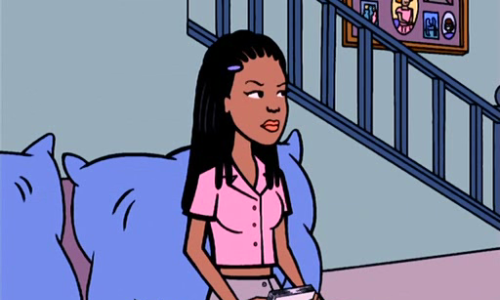
In the spring of 1997, MTV debuted Daria, an animated adult comedy series about Daria Morgendorffer, a socially awkward high school senior who was all too aware of the banalities of suburban life. Daria had more annoyances than friends, though she managed to connect with two of her equally aware peers—artist and cynic Jane Lane, and Jodie Landon, an excellent student who was likely one of few Black girls at Lawndale High School. Though Jodie was an all-around great kid (she was involved, polite and preoccupied with getting into a good college), her status as a token Black girl justifiably bothered her. Jodie was unable to falter, for fear of letting down the young Black girls who looked up to her. She was also the expert on Blackness. Her life wasn’t really her own, but such is the struggle of being the token Black girl.
Jodie often had to think of herself in relation to others. She had to consider how her behavior would make her parents feel and walk the tightrope of their expectations (which are often the result of the parents’ own tokenhood) coupled with the weight of respectability. Jodie was then forced to think about how her actions would reflect on Black people as a whole. The crown of Black excellence was heavy and was the source of a lot of unnecessary pressure for the teenager. In the real world, it sets Black girls up for a life of misery, even in the midst of perceived success.
Tokens are the result of contrived diversity — when a job, school, or industry realizes that they’ve failed to include a minority, or someone of a different religion, ability, or race. They hurriedly stuff someone who fits the bill into this slot, wiping their foreheads for sweat and applauding themselves for their “awareness.” Sometimes the selection is kind of based on merit, while other times it simply goes to whoever is available to fill the spot first.
Being a token Black woman is especially taxing, because you’re not only subjected to stereotypes, but like Jodie, you’re “Queen of the Negroes” — an appellation she gave herself in season two — the master of all things Black and the prototype for any other Black woman who enters the space. In short, it’s a special type of hell wherein you’re kind of rewarded (with money, opportunities, or both,) but primarily punished, for being who you’re asked, and expected, to be.
“But what about the living, breathing, complex Black women who desire a life beyond white ideas of what it means to be Black and what’s acceptable?”
“Black people have not been oppressed on the basis of their individual faults; rather, individual Black people have been discriminated against due to their association with the entire race,” wrote Lumumba Seegars for The Harvard Crimson in 2007. In her essay, Seegars made the point that Blackness was only tolerable in small amounts that white people could control. This makes the role of the token Black girl that much more unappealing, since they’re faced with the reality that they’re a “good Black person,” and have to reconcile with how much white approval has played into their success. No one wants to be the Black woman whose character has been solely been anointed by whiteness.
Tokenism is supposed to make white people feel comfortable and encourage them to pat themselves on the back for considering Black girls at all. But what about the living, breathing, complex Black women who desire a life beyond white ideas of what it means to be Black and what aspects of Blackness are acceptable?
Daria was conscious of its use of the token Black trope, and was able to turn it on its head. In episode six of season four, “I Loathe A Parade,” Jodie and her boyfriend, Michael “Mack” MacKenzie, are the Lawndale High School’s homecoming king and queen, and participate in the parade with their own float. Though winning a spot on homecoming court is some high schoolers’ dream, their joy was dashed by the realization that they were only winning, as their senior year wasn’t the first time they’d won, because they were Black.
“[I]t’s such a generous and enlightened act,” Mack said sarcastically through gritted teeth, as the couple’s float cruised down the street. “It completely makes up for the town’s utter lack of diversity, in my mind.” Jodie then made a note of the fact that through their participation, they were playing into the trope, alluding to its perpetuation. She wrapped up the conversation by stating how humiliating it all was, to be awkwardly celebrated for the very thing that white people have long been afraid of.
Other shows from the 1980s and 90s, including Saved by the Bell and Boy Meets World relied on their sole Black girl character (Lisa Turtle and Angela Moore, respectively) for the sake of representation, possibly not knowing the purpose of representation. It’s not about filling a quota, or being celebrated for your inclusivity, but rather a string tied around the finger that reminds us of how far we still have to go before Black women are considered people, and not a check mark.
In 2019, Deadline broke the news that Black-ish star Tracee Ellis Ross was set to executive produce, and star in, an eponymous spin-off centered around Jodie and her experiences. Jodie will follow the lead at her first post-college job, and like Daria, will give a satirical look at the culture we’ve created. Jodie is set to work in tech, and if it’s anything like reality, she’ll be the only Black woman in the office and will deal with all of the microagressions that come with it.
The show will be the first adult animated series about a Black woman since 2003’s one season sitcom, Hey Monie!, meaning that once again…Jodie will be the only Black girl in the room.
Photo credit: MTV